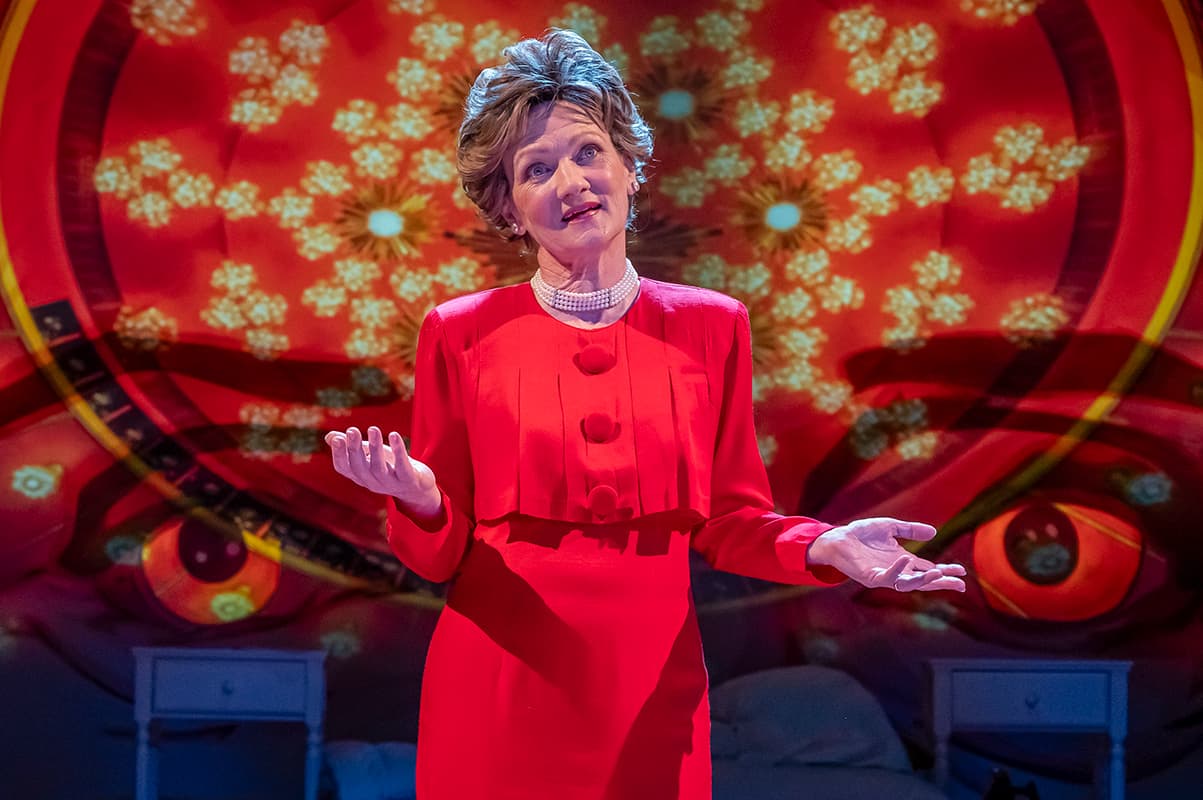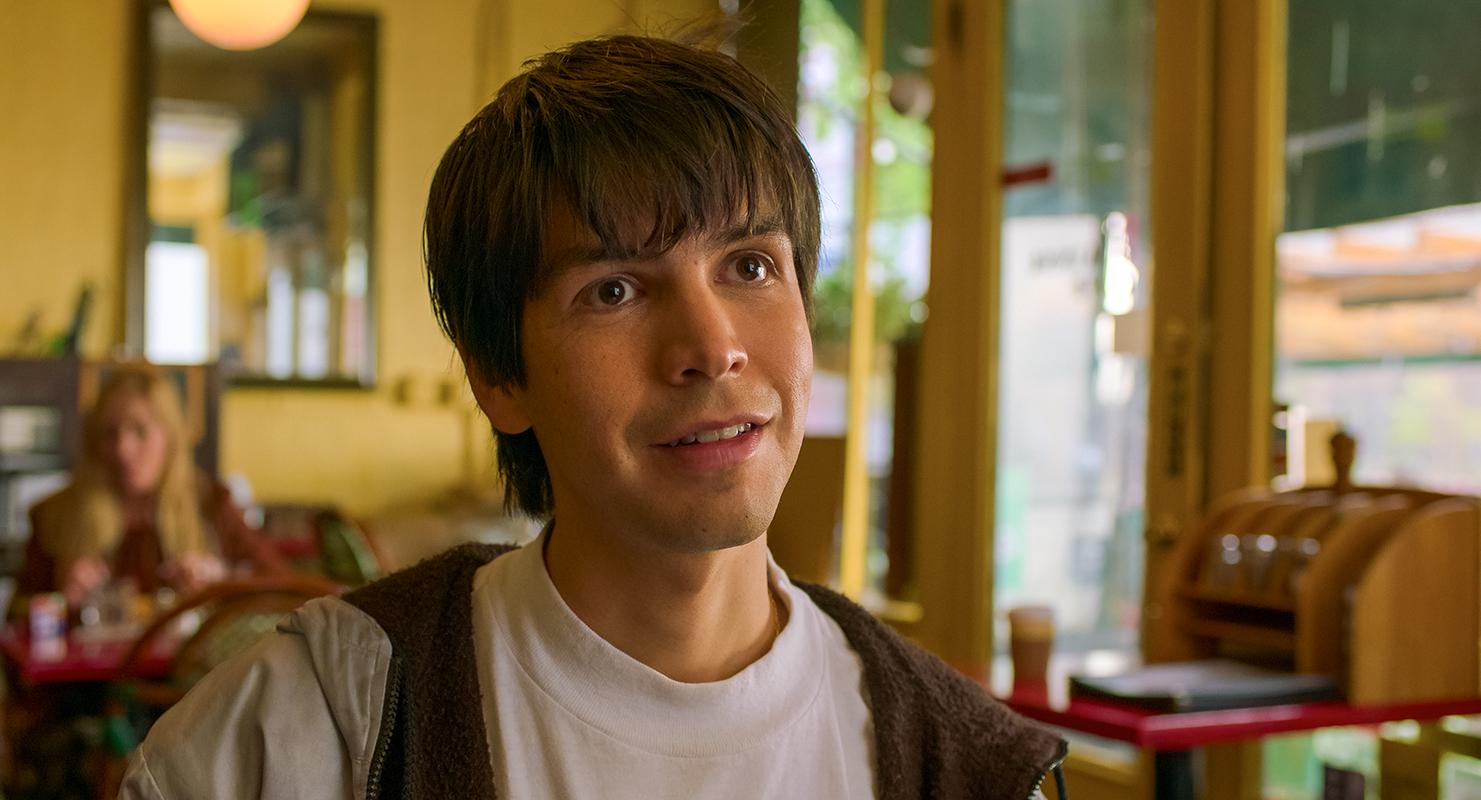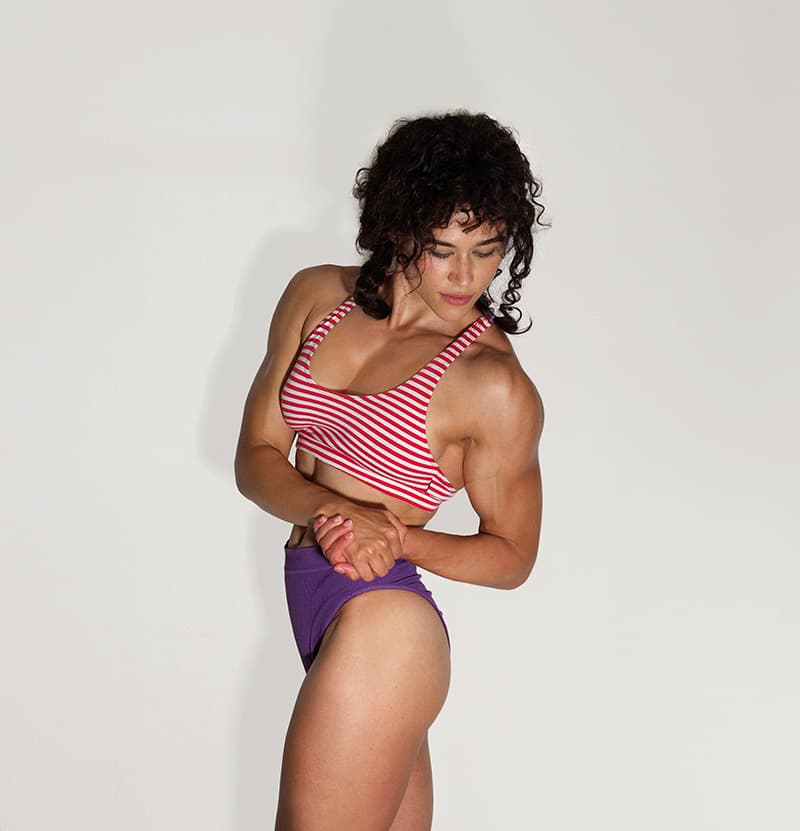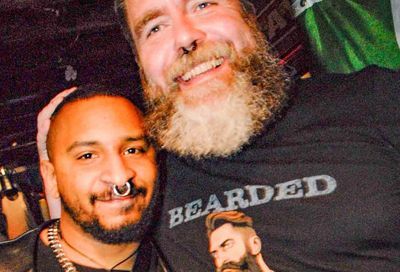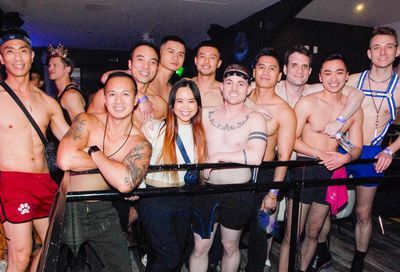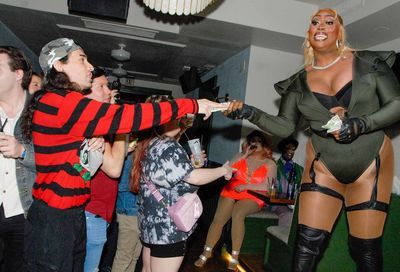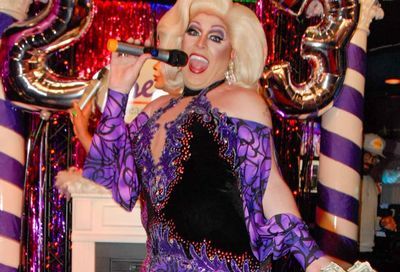“Pose’s” Ryan Jamaal Swain’s Bold Next Act
"Pose" star Ryan Jamaal Swain takes on the toughest role of his young career in Mosaic's harrowing and hilarious "One in Two"

Asked to name his favorite episode of Pose, Ryan Jamaal Swain, one of the stars of FX’s Emmy-winning, dearly missed ballroom drama, doesn’t hesitate a moment before responding. “Oh, of course. Season two, episode eight. Revelations,” he declares. “When I had to go off on people.”
Indeed, the memes are here to prove that fans of the show were gagging right along with the characters onscreen in Revelations when Swain’s usually demure dancer Damon explodes during an Evangelista family dinner scene, and doesn’t just start spilling tea but throws it scalding hot in the face of Billy Porter’s Pray Tell. The way Swain as Damon spits out the accusation, “It’s not because y’all fucking?” — it cuts deep.
The episode was a breakthrough for the character, and, also apparently, for the actor. “Honey. Let me tell you something,” Swain starts, teeing up the story as we chat about Pose and what comes after debuting on a groundbreaking hit.
“What can I say? More than you know, there were just so many mirroring things that were happening in that moment. And that was the first time where I was like, ‘Oh, I can really do this TV and film thing. Oh, I got the formula now. Oh, I got it. I got it.’ Because yeah, all of us, the people that I was looking forward to looking up to during that process, we were all figuring it out for the first time.”
Figuring it out, yet also, according to Swain, afforded the opportunity by creator-showrunner Steven Canals to have some autonomy over how the characters’ stories were told. “That usually doesn’t happen in an artist’s life, unless you’re a producer or you have creative capital on the table or monetary capital,” says Swain.
“And that particular episode was the one where Damon is graduating,” he continues. “And not only graduating from dance school, but also graduating from the old school of thought of being baby in the corner that doesn’t say too much. There’s something to be said about providing agency for yourself.”
Swain knows of what he speaks, having grabbed the reins of his acting career while still a student at Howard University, writing and creating his own material, before graduating to a featured turn as con artist Paul in Keegan Theatre’s 2016 production of Six Degrees of Separation.
Swain earned glowing reviews in the role, then quickly landed Pose. Now, at last, he’s returning to D.C., in Mosaic Theatre’s Raymond O. Caldwell-helmed production of Donja R. Love’s acclaimed queer and HIV-themed play One in Two.
Described as a “whimsical theatrical experiment,” the play, which premiered to raves Off-Broadway in 2019, is inspired by the playwright’s own experience living with HIV, and, though it’s often laugh-out-loud funny, the story challenges its audience to journey to deep, painful spaces.
Similarly, the play challenges its cast and company by leaving it up to the audience each performance to choose which of the actors — Swain, Justin Weaks, and Michael Kevin Darnall — will play which of three parts, One, Two, or Three. Swain, who saw the New Group production in New York, readily accepted the challenge.
“I think that when I got approached with this project, I had a really, really deep and very personal conversation with Reg Douglas, who’s the new artistic director of Mosaic. And I just loved his spirit,” Swain says. “I’m a Pisces, so I’m very discerning on people’s intentions, and I felt that his intentions were very pure and very honest and very genuine.”
It wasn’t just the collaborators who attracted Swain to the part. It’s the unknown that seems to excite him, “the caveat of these three actors, whoever steps into these roles, having to know all of the piece in its entirety, because there’s an audience vote that picks who plays which role,” he says. “So every night, your head has to be on a swivel. I was just like, oh my goodness, this is perfect.”
Swain missed the first opportunity to do the play, he says, because he was filming, and “I didn’t know that there was an audition for it. But I said, the second time that it comes around, and simply having a very personal relationship with Donja R. Love, who’s the playwright, and I’ve been wanting to work, or to be in partnership or communion with his writing and with his storytelling, I was like, oh, I have to do it. And all the pieces kind of fell together.
“I was like, this is going to expand me in many ways, and it’s going to ask me to go deeper inside of my crafting, inside of who I am and who I want to be as an artist. So it was just the perfect cocktail for, oh, we have to be a part of this now.”

METRO WEEKLY: I read One in Two, and look forward to seeing it. As an actor, have you had to do anything harder than this play?
RYAN JAMAAL SWAIN: No. [Laughs.] No. Usually, you are used to going with one character, putting all of your heart and soul into that. Or if you have a role that decides to tap into multiple characters, you only do that consistently every day of the week. You know exactly your beginning, your middle, and your end. With this one, specifically, you don’t know. You don’t know. When you’re in rehearsal for something like this, you can’t really get married to any type of experience or any type of choices, because you’re exploring many different ways while also being like, okay, now you’re moving to this person.
Or how it’s been constructed in the room now, which I think that it’s a really powerful kind of construction of, “All right, you’re not only having to be in control of your crafting of these characters whose stories we’re telling, but also you have to be in communion and in collaboration with two other actors in the fullness of how these people respond, how they interact with one another.”
So I’ve never had more of a — for lack of a better word — mindfuck. But then also, I’ve never had this much fun seeing how other people come to, “How does this character come to this line?” “How does this person tap in on this?” “Oh, I never even thought about that. Let me take that and put it in my own pocket for when I have the opportunity to portray these folk.” “Oh, I love that you chose that, Ryan. Oh, let me use that.” I’ve never been in a process where we’ve had to be so collaborative, in my life. So it is one of the hardest things, but it’s also one of the most rewarding because I feel myself, in the stress and in the anxiety of it all, expanding. I feel that I’m becoming a deeper and richer artist because of it.
MW: And how do you rehearse it? Are you Number One all day, or is it that you’re switching around, you’re Two for this hour, and then after lunch, you’re going to be number Three? How do you guys do it?
SWAIN: So when we were blocking the show, there were tenets that we all agreed upon that these characters have, their physicality, their voice quality, things that we all collaboratively are like, okay, cool, we understand. We agree upon this. So there’s a familiarity and a familiar language that we all are speaking. As we are putting movement with these certain scenes and vignettes in the piece, it’s like, “Okay, well that was one iteration. Now all y’all switch and pick another role.” It’s more like guidelines and guideposts, and how you find yourself there. And then somebody might do something that’s like, “Oh, that makes more sense. Okay, let’s do that.”
Raymond has constructed the [rehearsal] room to be very collaborative and very kind of organized and specific, and we have our guideposts. We have to get to these moments, this moment, this event, this tableau, this picture — it’s dealer’s choice how you get there, but by this time you need to get there.
So I think that it’s going to be exciting to see, especially as we move into tech rehearsal this weekend — the lights, the sound, the props, all of these things, and how they also have to have their head on a swivel of who’s being chosen for these particular roles, where they are respectively on this side of the stage, etc.
So it just asks everyone to be present. And the rehearsal process has been a true essence and a true calling to, what does it mean to be present, just present fully in the room, present, you ain’t got to be thinking about too much. The scene goes from here, then you got to switch over to another character. You have to just be present and also fully engaged in what’s happening. And it’s been fun, but child, it has been a lot. We are doing the best that we can with what we got.

MW: Reading the text, I understand how personal of a story this is for the playwright, Donja R. Love. And throughout the show, I’m just anticipating that it is intense and intimate for the actors, with moments that could leave you all, whether you’re One, Two, or Three, feeling really exposed. Is that the case? How are you handling exposing yourself through the character that you’re playing?
SWAIN: This is the first time in my life and in my career where — and I’m going to be totally honest with you — where I’m in a space in my life where I’m setting boundaries, real deep, deep boundaries for my own mental health and my physical health. When I graduated from college in 2016 and then got Pose right after, in 2017, I was a young kid putting my body and my mind and my spirit and my emotional state on the front lines, because that was the natural inclination. I was like, “Ooh, I can do this,” and “I can get up, cry, boohoo on set in front of people, use me as a catalyst” and then go home and kind of shake it off. But not really.
I realized that that was a losing approach, because after the show, it was just like, “Oh, wait, I exposed a deep, deep wound inside of me, and now it’s for everybody to comment, to bear witness to before I even did the healing.” So I think that now in this particular process, I’m understanding that I really get to show the bells and whistles of my crafting and my training, being able to craft characters completely outside of myself, thinking about their physicality, thinking about their voice qualities, thinking about things that are outside of myself, that we go from this approach of outside in, where we are crafting this person outside of myself. This is not Ryan Jamaal Swain on that stage. This is this character, this is this character, these are these parameters. So I can put on that hat when I’m at work, and I’ll take that bitch off when I get home.
I think that just knowing how personal this conversation is for Donja, I don’t take it lightly that we’re doing some incredible work in making the story authentic and real and genuine, but also I have to be able to be okay outside of this after this ends.
And so me and my castmates and the team at Mosaic are doing everything they possibly can to ensure that we are taking care of ourselves, from mental health specialists to people being able to just move at our own pace. And we’re moving at a pace where when we have to really tap in and deepen these conversations. We’re handling it with grace.
For me, it’s tough material. It’s tough material. I’ve had a tendency to be a part of tough material for the last five years. But as I learn myself and I excavate and craft and unearth the type of artist that I am, and who I want to be, and who I have become, I’m realizing the importance of training, of boundaries, of making sure that you stay cognizant of what you need for this process so you can be okay beyond that.
I mean, this is great because in many ways, coming back to D.C. is kind of like, “Ooh, all right, we’ll be back home. Okay, girl, you have nowhere to hide. Do what you do. Really, really exercise these muscles that you found here, that you have learned here.” How do you take care of yourself in really uber-high-stress situations? This is one of those exercises and experiments where I’m being asked to do that.
MW: There’s a line in One in Two that really jumped out at me, that’s spoken to someone struggling with being HIV-positive, “Sometimes the hurt is a bigger virus than the HIV,” which can mean different things to different people. What meaning do you ascribe to that line?
SWAIN: Oftentimes, as a Black and Brown queer person or LGBTQIA+ person, underneath that umbrella, we always have to go through that checkpoint of shame and guilt. And oftentimes that can be a heavier burden than just living your truth. I go on record always saying that your trauma is not your responsibility, but your healing is. And I believe that intently, because as Black and Brown folk, as queer folk, as LGBTQIA+ folk, your truth sometimes doesn’t warrant your safety.
We have legislation and things that are happening presently that are just trying to steal away people’s opportunity to live freely as themselves, live in their truth. And so with that, and then knowing [that] we’re talking about this particular story where there is a Black queer man as the catalyst, and you have three queer Black men that are telling this story. We all have our different relationships with shame and guilt, but all similar things because it all comes up in that way of shame and guilt in some way, shape, or form.
And, yeah, your trauma’s not your responsibility, but your healing is, I just cannot stress that enough. More than ever, I think trans folk, gender-nonconforming folk, queer folk, we’re in this yearning for people to see us, and to be truly seen and truly valued and truly appreciated — which it should be just a human right and just humans’ natural inclination to do that.
MW: What did you study at Howard? And at what point while you were there, did you start doing productions outside of school? Because I saw that you did Six Degrees at Keegan.
SWAIN: I heard that you was going to know your stuff. [Laughs.] So I was a theater arts major, concentration in musical theater first. And then I got asked to leave. I’m just laughing because it was so unserious. It was so unserious. But I was a theater arts major with a concentration in acting. That’s what I graduated in, that’s my degree. And I started doing projects my senior year. I did 295 North at Signature Theatre. That was their “Signature in the Schools” production, because I realized that, “Oh, this part of my journey is about to come to an end.”
And also knowing how this industry works, you have to have one foot in and one foot out, honey. It is about relationships. So realizing that next level is like, “Okay, well, let me use the tools that I have been sharpening here out in the world, try ’em out. Oh, people are tapping in.” And it’s funny that you bring up Six Degrees of Separation because that was one of those projects that I didn’t think would come to me up until I was this age. But it came to me literally maybe a few months after I graduated, I think, because that was fall of 2016. And that was something that really has been on my bucket list to do. I said, “Oh, I’m moving in the right direction. Oh, okay. All right. There’s a conversation that’s being had here with the universe that’s, oh, okay, we’re making the right decisions.”
So yeah, I think about Howard very fondly, because prior to that — I’m from Birmingham, Alabama, went to performing arts high school where Laverne Cox went, where Susan Collins, all these folks have been to this, really an incubator for creative thought in Alabama, Birmingham of all places. So it’s just like, you’ve got a bunch of creative kids in the Bible Belt South, and being able to be asked and to be nurtured to just be who they are. So I was grateful for that school. But then also, being there, I realized that the Black community and the Black and Brown children there were only 30 percent of this school’s population. So then coming to Howard, it was like, oh, wait, I’m not just “the Black kid that has talent.” There’s other talented Black kids as well. So what makes you you? What makes you unique beyond any type of racial thing?
And that was really a deep, deep conversation that I had to have with myself. And I’m grateful that I have, because I’m not out here not knowing who I am. While I was at Howard, I was able to go overseas to study with other people, and other Black and Brown people at different conservatories and different schools around the country, around the world. And there was just from them, an appreciation of, “Wow, how did you do that? How did you come up to this story, and do it and speak it in this unique way?”
And I think that’s really a byproduct of Howard’s training, because you just have to really have a deep conversation with yourself and a really, really sobering and harrowing conversation that exposes your brokenness, that exposes your joy, that exposes your happiness, that exposes all the messiness of you, but also all the things that make you so undeniably special. And so undeniably light-filled, and I’m grateful for that. I’m grateful, grateful, grateful for that.
MW: Were you out at Howard, and did you participate in any DC Black Pride while you were here?
SWAIN: As a byproduct of being a Black queer child, we often go to that golden boy complex, or Golden Child Syndrome, or overachiever. So while I was at school, I was really just about getting to graduation, doing what I needed to do while I was there. So strangely enough, I didn’t even know DC Black Pride was a thing until after my freshman year, because it is always at the end of May.
I remember specifically just happening upon an event and somebody being like, “Oh, it’s DC Black Pride.” And I’m like, wait, what? What is this? To answer your first question, was I out? I mean, yeah, I guess. I’m a very private, very, very private person just in my own life. So my friends, my family, they knew. But I was so gung-ho about getting every little sliver of what I needed before I left here that I wasn’t really participating. Now I love it. Now I understand how that’s a part of the developmental stage of anybody’s life — you have to have balance. And I was not one that knew balance back then. It was just getting to the work, being around the work, golden boy syndrome, overachiever complex. Just being like, oh my goodness, okay, well, here we are, we got to work harder than everybody else. And then Pose really was the first time where I was like, “Oh, I can breathe.” Because my research asked me to be a part of queer culture in some way, shape, or form when I was crafting this character. So I would be going out and doing this.
And even in my thesis project, my senior year at Howard, I made this fictional character, this fictional drag queen during the Stonewall era. I read every book and I watched every video pre-Stonewall and post-Stonewall, and that was my first time tapping into Paris is Burning. And so moving into my next sector — God is so good, I mean, the universe is great — moving into my next year of life is like, “Oh, wait, this is about to be a part of your world in an exponential way, in very crazy, astronomical ways.”
So yeah, DC Black Pride, love it now. Love it now, been a part of it. Got the T-shirt, got the hat, got everything to prove that I’ve been there. But while I was in school, absolutely not. I didn’t know that that world was available to me. I just didn’t know, and I had no way into it, because Howard’s program is a very conservatory-style program and a very rigorous one. So at the end of the day, my queer mentors, my mentors at that university were specifically just academic. So moving into the sectors of my queer culture, it was like, “Wait, what? I can do this? Yeah, yeah, yeah, yeah, yeah.”

MW: I’ve read that going into playing Damon, you were not steeped in the knowledge of everything ballroom. So you were having to learn about it while also being very visible as a representative of that culture. What was that like?
SWAIN: It was so much fun, because I’m a big research and history buff. So for me, anything that taps in, and I think that every Black and Brown person is like this, because with our White counterparts, they’ve got family crests. You’ve got a ring, you know exactly where your people come from, you know exactly the line down the path. And somewhere, in that captivity moment of Black and Brown people, our history got a little bit lost. And so, for me, I find that every time that I have the opportunity to meet myself and meet people that have come before me, be a part of me, perhaps be related to me, tap in, it has been a joy. It has been a true joy. And like Damon, Ryan was very much ballroom adjacent. I didn’t even know there was a ballroom community in Birmingham, Alabama while I was there. That was, again, me just on this beaten path of, do what you need to do to get up out of here.
So moving into Pose, and truly having to go to the places in New York where all of these people that I have watched, all these people that I’ve been inspired by — ooh, I get emotional just thinking about it — and just feeling the spirit of these folks telling me, keep going, keep going, keep going. [Tears up.] Best experience of my life. Because it just teaches you who you are, and who you can be, and who you have been in different reincarnations or incarnations.
For a queer person, specifically a queer person of color, to find community, physically and spiritually is probably one of the best feelings in the world. I just love being a part of this community. We are some of the most beautiful people in the world. And it was a true joy to be able to tap in, in that journey and in that way, and I would do it all over again. And consistently, even now, being a part of this community, and then also having to be a spokesperson and an icon in this community, is crazy. It’s crazy! You’re learning yourself, but then you also have to reach back as you climb. It is a true joy.
But my biggest joy is just to be able to see, and to bear witness to all these stories of people finding themselves, people being able to invite in their family members through Damon’s story, or through Pose, in particular, being able to provide a vocabulary for the older generation, for them to see somebody and say, “Oh, that’s my grandchild. That’s my nephew, that’s my niece. Oh wait, let me have this conversation with them.” Entertainment has the capacity to change the molecular structure of your heart and mind, and I’m overly grateful that I was a part of that in a huge way for so many people internationally. For real. It’s crazy. It’s crazy. It’s crazy.
MW: A lot of people didn’t really know about ballroom before Pose, and now they can find it elsewhere in culture: Legendary, Renaissance. Beyoncé’s literally taking it all over the world.
SWAIN: All of my friends that I have met through ballroom are on that tour, and I’m just like, “Oh, work bitch, work bitch, you better go!” We’ve been through a crazy time. We had an administration that was spewing out alternative facts, lies, half-truths, deceits, and deception. There was a moment when we wanted anything that was authentic and real. That’s what happened when Pose came out — we want real stories, we want real things. No matter what the quality level is, it’s like we want to know that what we’re seeing is the truth, or is somebody’s truth, not lies.
Then going into how Pose really revolutionized and kind of just changed American television history for good, and you get to see people who have these idiosyncrasies and intersections, but then that’s not all that they are. They’re just people. You take a very specific story and you illuminate a universal truth, and that gets people thinking, “Oh wait, well, we’re not that different. Oh, wait, no, we’re not. Oh, I see myself in this trans woman, or I see myself in this Black queer baby, or I see myself in this HIV-positive person on this show. Beyond their circumstances, I see connection.”
Then moving into the next sector, people, in the pandemic, we had some time to think, we had some time to be with ourselves, good and bad, having to do that check-in, because we had to. We couldn’t go nowhere else. So then now we’re moving into this sector where, honey, I just want to live and be in joy. I don’t want to hurt. I don’t want to hurt. So how can we move forward with that? And the most desperate of us, which usually is Black and Brown people, the most disrespected are Black and Brown women, Black and Brown LGBTQIA+ folk.
What I will say, [the paradox] of those people that are most disrespected and most kind of shunned away beyond the margins, is that we have a capacity in finding our own joys, finding our own pockets of truth and love, and making space for things that just give us some semblance of hope. And a resilient people is a very dangerous people.
Moving into the sector of Beyoncé and this Renaissance tour, there’s no coincidence that is what is happening, and how she found herself to queer people of color in her storytelling. Because at the end of the day, there is something that is really, really ancestral about a resilient people finding joy, finding their own voice, and reclaiming their own voice. That’s joy. I don’t know any queer person that hasn’t had to have that type of revealing truth, seeing the response, being hurt by it, and then showing up and re-finding, reclaiming their voice and reclaiming their time. And so we’re just great. We bomb. We bomb, we bomb.
MW: Damon was a lot of people’s entry point into the world of Pose, and at the end of the show, we missed Damon and you in the final episodes. I think a lot of people might not know why we weren’t seeing you. Do you want to talk about it?
SWAIN: Yeah, we can talk about it. So during the pandemic, my sister got tragically shot and killed. And we try to, as one does, in moments of duress, as I’ve talked about, we tried to push through with that. There was a moment where I had to realize, what do you need, Ryan? What is more important to the longevity of your career? Because my mental health, my physical health was just waning, because I had lost someone. I experienced a huge loss, someone that has been my North Star, the reason why I do what I do, one of them, one of the pieces of my North Star.
So being able to have that happen in a moment where I’m excavating and coming back to self is like, wait, beyond what I do, I have to be comfortable with who I am. So we made the decision that it was time for me to just take some time to really sit with that and mourn and grieve and really heal, and make space for what that new normal looks like in my life. And my cast, the creative team, the producers just held me up in a way that I’m uber thankful and uber grateful for in that time. But it was tough.
Beyond — and I want everybody to know this, [because] we’re dealing with the writers’ strike right now — beyond what you do, you’ve got to be comfortable and safe and healthy in who you are and what you need. Because this industry is like a machine. It will just keep going and keep putting new cogs in the machine and new pedals and different machinery, and it will keep going. What does it look like for you? Are you okay with you? And I had to ask myself that question, and I had to make the necessary adjustments.
So that’s why you didn’t see Damon. It wasn’t because he was drinking or going off. It was just because that’s what was happening in my life, and I’m grateful that I made that decision. I’m grateful, and I’m happy that I did, because it allowed me to have a little bit more autonomy at how I now move through my process. And I think that was my first inclination realizing that I’m not just what I do. I am who I am, and I need to be healthy and happy and in a mental space and mental capacity to do the work that I want to do, and to give myself over to that. But at that moment, yeah, there was no other choice. There was no other choice.

MW: I completely understand. Especially given how things are in this country right now, I’m curious how you’re feeling about, or if you have any hope for, how we might deal with gun violence as a nation, because it is epidemic?
SWAIN: Well, first off… Yeah. How do I…
MW: I’m sorry. I know it’s a sensitive question.
SWAIN: Ooh, child. No, no, no, no. It ain’t sensitive for me. I believe that there needs to be more strict parameters around how… there just need to be gun laws, there needs to be stricter gun laws, child.
I mean, for someone to be able to shoot up an elementary school, to kill innocent babies, to kill innocent church members, to go into a grocery store and just open fire because “I’m upset with the world, and this is what I have been peddled to believe, so I’m going to kill all these Black folk.” To the gun violence within police brutality, to the plight of just gun violence in general. I was just in the barbershop the other day, and they were talking about one of the barber’s sister had a child who, they were at a stoplight, and these folks started opening fire right in front of her, and one of the strays ended up killing this baby in the backseat, went straight through her eyebrows.
It’s too accessible for the wrong people. And beyond that… what country was I looking at that, after they had a huge massacre at a school, I think it might have been Scotland?
MW: Scotland had Dunblane. Yeah.
SWAIN: There was a moment where I think everybody in the city or the country just gave up their guns. I think it was something like that.
MW: New Zealand had a similar thing happen.
SWAIN: Yeah. I just don’t understand why it’s this hard to understand that innocent people are being taken in the senselessness and the carelessness of gun violence. It doesn’t make sense to me why it’s such a hard thing to bear witness to. I understand the safety and the protection of having a firearm in your home, I understand that. I get it. But also it’s like…[shaking his head].
MW: We’re of a similar mind on that. I wanted to ask you also about your writing. You wrote and performed a one-man show called A Negro Writer about Langston Hughes, and you’ve been writing a book. So what kind of writing do you think we’ll see from you?
SWAIN: I have a few projects that I’m excited about. I had the opportunity to tap into Gary Fisher’s work, who is a prolific queer writer of color. He passed away, and his writings were released posthumously right after. Also, I’m being approached to kind of develop that as an actor, as a biopic for this man’s life.
And then I was able to do a reading of Randall Kenan, who’s also a queer, Southern Black man. And he has this piece called Black Folk Could Fly. And he has these short stories in each chapter about his life: cooking greens with his mom, having this moment with this girl, having this moment with this man. And similarly with A Negro Writer, Langston Hughes had this autobiography called The Big Sea, where in each chapter he talks about just certain instances in his life that have shaped him. When he was 11, when he stopped believing in God, when he dated this girl named Mary in Paris, when he went to his first drag pageant, all of these things.
And so I’ve been mulling over the fact of, do I want to write a semi-autobiographical novel, teen fiction moment, young adult storyline, or do I want to do the semblance of stories? And I sat down and I started writing, and all of the memories started flooding in of what I wanted to write. I was asking my mom, “Oh, what was my stepdad’s truck? What was the make of it? What was the color of it?” All of these things. And I said, “Ooh, we’re about to go down that deep dive of traumatic recanting. Okay, cool.”
So I was like, again, this whole idea of having a little bit outside of myself, so it’s semi-autobiographical, and I’m writing, specifically a young adult fictional story, and also a collection of short stories that hopefully in the next year or two will be published.
MW: Speak it into existence.
SWAIN: I’m trying to be like, what can I say before the contract is signed? But that’s what I’m looking forward to. I love writing, and I love stories. And I’ve been inspired by my friends who are also writers of color, George Johnson, Camryn Garrett, all these folks. And I’ve been talking with them and they’re like, “Ryan, you can do it. You’re a great writer, girl. Do it.” So I’m excited about that. That’s all I want to say.
MW: I’m going to look into some of the writers you mentioned. So what is the post-Pose landscape that you envision for yourself, and so far how is the reality living up to that?
SWAIN: I think having Pose very early in my life, and the first step of my journey as a professional actor and people’s exposure to me, is very intimidating. It’s very intimidating because it’s like, “Ooh, girl, okay, you came out swinging.” But then I’m also the antithesis of being intimidated, like, “Yeah, I did and I was ready for this.”
Post-Pose has provided me with the opportunity to work with Viola Davis on The First Lady, to be able to be in concert with her and JuVee Productions and be able to do that. To be in Choir Boy with Tarell Alvin McCraney, to work with him in that, to be able to just have a little bit more autonomy. And I’m in a very special place where people know who I am, but they haven’t seen all of who I am, and all of my process and how good of an actor I am versatility-wise.
So it’s been a joy to be able to be like, oh, you’re not coming out of a process without any type of skin in the game. So people want to hear what you have to say, and people want to work with you and want to tap in with you. But I think for me, Pose really, yes, it has spoiled me in some ways. It has taught me valuable lessons and just development. I mean, I came out of school into that. So there was a whole slew of audition etiquette that I didn’t know. Beating the pavement just as much as my other brothers and sisters and siblings as well now. And that’s a joy because it reminds me of the hustle mentality that I tapped into and was able to nurture here at Howard and in D.C., just reminds me of that moment where it’s like, ooh, yes. But we have a film coming out very shortly, Lord willing, can’t wait till that comes out.

MW: Which movie?
SWAIN: It’s called One Million Followers, and it’s a thriller. It’s my first time doing a film and also dealing with a character that’s not so nice, which I’m excited about. Again, going into the versatility of the skillset. And then just being behind the scenes and producing and directing and writing, and hopefully, Lord willing, having a book that turns into a TV show or a film. Really just thinking about ways in which I can really flex my hat as a storyteller and a creator.
Because beyond the acting tidbit, I’m a storyteller and a creator. I love creating opportunity for myself, creating opportunity for others, and creating stories that are impactful and creating characters that are impactful. And so that’s what I’ll say right now.
We are speaking life over copious, copious amounts of abundance in projects, copious, copious amounts of awards, copious, copious amounts of love in my purview, and just joy and happiness. True happiness, not escapist happiness, or just escapism. I am conjuring and I am praying upon that to be a part of my life, and to find me. Just as much as I am yearning for it, it is seeking me.
Mosaic Theater’s One in Two runs through June 25 at the Atlas Performing Arts Center, 1333 H St. NE. Tickets are $29 to $64, with economy ticket options for each performance. Call 202-399-7993, ext. 2 or visit www.mosaictheater.org.
Follow Ryan Jamaal Swain on Twitter at @RyanJamaal.
Support Metro Weekly’s Journalism
These are challenging times for news organizations. And yet it’s crucial we stay active and provide vital resources and information to both our local readers and the world. So won’t you please take a moment and consider supporting Metro Weekly with a membership? For as little as $5 a month, you can help ensure Metro Weekly magazine and MetroWeekly.com remain free, viable resources as we provide the best, most diverse, culturally-resonant LGBTQ coverage in both the D.C. region and around the world. Memberships come with exclusive perks and discounts, your own personal digital delivery of each week’s magazine (and an archive), access to our Member's Lounge when it launches this fall, and exclusive members-only items like Metro Weekly Membership Mugs and Tote Bags! Check out all our membership levels here and please join us today!




